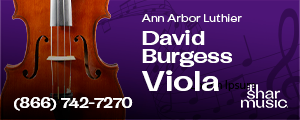Intermediate to advanced
At what level do you call someone an intermediate player and when advanced? And why does it take soooooo long to get out of that intermediate fase? It looks like years for the most of the players I know. And what can you do do to speed up the proces? Tweet
Replies (23)
Generally, anything Bruch and above is considered advanced in the overall repertoire, considering the early Twinkles all the way through the hardest concertos. I would consider intermediate Vivaldi a minor through Kabalevsky or DeBeriot roughly.
However, many people often refer to the concerto repertoire in another way. Beginning would be pieces like Vivaldi, Haydn, and all the way to Kabalevsky. Bruch, Lalo, Saint Saens, and even Vieuxtemps are intermediate. Any of the big warhorses (and modern concertos) like Tchaikovsky, Beethoven, Sibelius, or Shostakovich are advanced.
To Gordon's point, it's about how you play whatever you play, and that's something that can't really be disguised, even if I'm somewhat cynical about the credulity of most audiences.
I'm probably wrong but for me the Beethoven concerto is much more playable than those of Saint Saens and Vieuxtemps.
We can of course say that it is more demanding in terms of "musicality". (even if many examples of recordings by very young violinists prove that musical genius does not wait for age..)
How about we define (late) beginner, intermediate and advanced by how someone plays a piece common to all rather than by the technical difficulty of the piece? For example, listen to Itzhak Perlman (Concertos from my childhood) play the Andante from the Violin Concerto in B Minor, Op. 35.
https://www.youtube.com/watch?v=tw65KMI_YwI&list=OLAK5uy_kN0-4nZnZBYSLrnQUMwNMmU6oc1xQ3l5k
IMO defining playing levels by concerto might be very useful to the teaching process - but it is not useful at all to the business end, and that is the listening one. I have heard virtuosically-technically brilliant violinists who could play the whole gamut that make me want to run screaming from the auditorium. And I have heard the opposite, ones that played simple songs and brought me to tears with subtle nuance and might-bending projection. Which one of these is 'advanced' and a 'beginner' in the ears of the audience - which we here too often forget is the actual purpose of playing an instrument.
That suggests that the performance determines the stage. And here's the real kicker: if you want to reach the next level in your playing, make sure your teacher is performing at that stage.
The use of "beginner", "intermediate" and "advanced" is almost always in the context of pedagogical reference. So it's kind of pointless to define "advanced" as equivalent to "professional". Professional is professional (although there are certainly pros that cannot play advanced-level repertoire, i.e. not capable of technically executing a listenable Bruch, much less a beautiful one).
Some students certainly "advance without improving" -- i.e. they play harder and harder repertoire without fundamentally improving their technical foundation. This can get players into a house-of-cards situation where they can theoretically read the notes of advanced-level works but the poor technical foundations are obvious.
(Some of you may remember a parent who posted their son's Bruch recording some time ago -- this was a clear example of advanced repertoire on a shaky foundation, and ultimately the parent took the advice of commenters, talked to the teacher, and the kid was put through a technical reboot.)
This discussion has been archived and is no longer accepting responses.
Violinist.com is made possible by...
Dimitri Musafia, Master Maker of Violin and Viola Cases
International Violin Competition of Indianapolis
Violinist.com Holiday Gift Guide
Johnson String Instrument/Carriage House Violins
Subscribe
Laurie's Books
Discover the best of Violinist.com in these collections of editor Laurie Niles' exclusive interviews.

Violinist.com Interviews Volume 1, with introduction by Hilary Hahn

Violinist.com Interviews Volume 2, with introduction by Rachel Barton Pine











